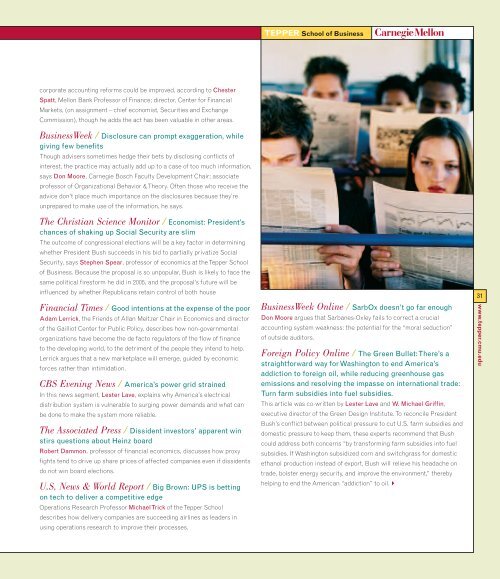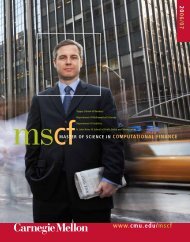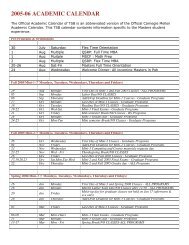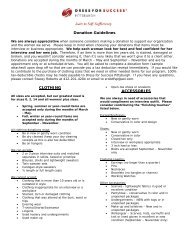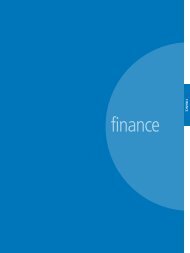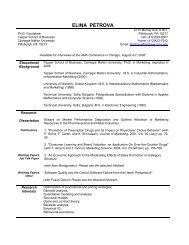tepper - Carnegie Mellon University
tepper - Carnegie Mellon University
tepper - Carnegie Mellon University
Create successful ePaper yourself
Turn your PDF publications into a flip-book with our unique Google optimized e-Paper software.
TEPPER School of Business<br />
corporate accounting reforms could be improved, according to Chester<br />
Spatt, <strong>Mellon</strong> Bank Professor of Finance; director, Center for Financial<br />
Markets, (on assignment – chief economist, Securities and Exchange<br />
Commission), though he adds the act has been valuable in other areas.<br />
BusinessWeek / Disclosure can prompt exaggeration, while<br />
giving few benefits<br />
Though advisers sometimes hedge their bets by disclosing conflicts of<br />
interest, the practice may actually add up to a case of too much information,<br />
says Don Moore, <strong>Carnegie</strong> Bosch Faculty Development Chair; associate<br />
professor of Organizational Behavior & Theory. Often those who receive the<br />
advice don’t place much importance on the disclosures because they’re<br />
unprepared to make use of the information, he says.<br />
The Christian Science Monitor / Economist: President’s<br />
chances of shaking up Social Security are slim<br />
The outcome of congressional elections will be a key factor in determining<br />
whether President Bush succeeds in his bid to partially privatize Social<br />
Security, says Stephen Spear, professor of economics at the Tepper School<br />
of Business. Because the proposal is so unpopular, Bush is likely to face the<br />
same political firestorm he did in 2005, and the proposal’s future will be<br />
influenced by whether Republicans retain control of both house<br />
Financial Times / Good intentions at the expense of the poor<br />
Adam Lerrick, the Friends of Allan Meltzer Chair in Economics and director<br />
of the Gailliot Center for Public Policy, describes how non-governmental<br />
organizations have become the de facto regulators of the flow of finance<br />
to the developing world, to the detriment of the people they intend to help.<br />
Lerrick argues that a new marketplace will emerge, guided by economic<br />
forces rather than intimidation.<br />
CBS Evening News / America’s power grid strained<br />
In this news segment, Lester Lave, explains why America’s electrical<br />
distribution system is vulnerable to surging power demands and what can<br />
be done to make the system more reliable.<br />
The Associated Press / Dissident investors’ apparent win<br />
stirs questions about Heinz board<br />
Robert Dammon, professor of financial economics, discusses how proxy<br />
fights tend to drive up share prices of affected companies even if dissidents<br />
do not win board elections.<br />
U.S. News & World Report / Big Brown: UPS is betting<br />
on tech to deliver a competitive edge<br />
Operations Research Professor Michael Trick of the Tepper School<br />
describes how delivery companies are succeeding airlines as leaders in<br />
using operations research to improve their processes.<br />
BusinessWeek Online / SarbOx doesn’t go far enough<br />
Don Moore argues that Sarbanes-Oxley fails to correct a crucial<br />
accounting system weakness: the potential for the “moral seduction”<br />
of outside auditors.<br />
Foreign Policy Online / The Green Bullet: There’s a<br />
straightforward way for Washington to end America’s<br />
addiction to foreign oil, while reducing greenhouse gas<br />
emissions and resolving the impasse on international trade:<br />
Turn farm subsidies into fuel subsidies.<br />
This article was co-written by Lester Lave and W. Michael Griffin,<br />
executive director of the Green Design Institute. To reconcile President<br />
Bush’s conflict between political pressure to cut U.S. farm subsidies and<br />
domestic pressure to keep them, these experts recommend that Bush<br />
could address both concerns “by transforming farm subsidies into fuel<br />
subsidies. If Washington subsidized corn and switchgrass for domestic<br />
ethanol production instead of export, Bush will relieve his headache on<br />
trade, bolster energy security, and improve the environment,” thereby<br />
helping to end the American “addiction” to oil.<br />
31<br />
www.<strong>tepper</strong>.cmu.edu


